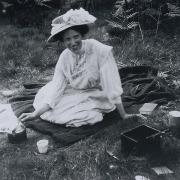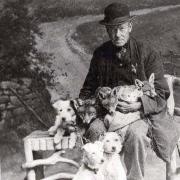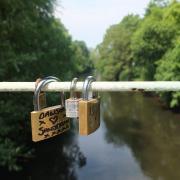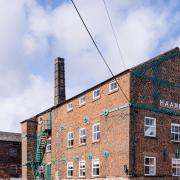Derbyshire Life talks to Warren Slaney about the challenges of running one of the most famous fly fisheries in the world – and finds out what has happened to Lathkill Dale’s missing water

We are on the A6 coming out of Bakewell towards Buxton. I’m with Warren Slaney, Head Riverkeeper on the Haddon Estate. He is driving a Land Rover, a proper one, one with dents and scratches, and – well – I’d spent the last few minutes trying to figure out what the smell actually was, but then it came to me: it was like over-ripe seafood. But I think it was probably crayfish.
Suddenly Warren swings over and parks in a lay-by. ‘Come on,’ he says, jumping out and crossing the road.
He unlocks the gate then walks briskly down the unmade lane towards the River Wye. I try to keep up. He says ‘Hello’ to a fly fisherman, leaves him in a spin, then tells me about the old mill as we hurry past. He calls it the Bobbin Mill – they used to make the bobbins for the cotton mills at Litton and Cressbrook from ash trees growing on the hillside.
Then, without warning, he strides off the track to where a gush of water flows from a dark, gated-off tunnel to join the River Wye. It turns out to be a sough built many years ago to drain the nearby Magpie Mine.

Warren jumps down into the sough in his wellies, makes a big splash and then turns expectantly, as if waiting for me to follow. For a moment he reminds me of my young nephew, playing in puddles. But I am not dressed for it. His disappointment is only momentary, then he calls triumphantly over the tumult: ‘This is it! This is the Lathkill’s missing water!’
Less than an hour earlier we had been on the tranquil banks of the River Lathkill near the house where Warren lives on the estate, on the lower reaches of this picturesque tributary of the Wye. Warren had been telling me how the sough built to drain the Magpie lead mine near Sheldon had led to water that should have entered the Lathkill being diverted into the Wye. This causes the upper reaches of the Lathkill to disappear at times of summer low water, leaving hundreds of fish stranded and an annual flurry of stories about people with nets and buckets on emergency rescue missions.
Academic research has proved that water is being diverted to the Wye from the Lathkill, and this has confirmed Warren’s own research at the British Library, where he found an old newspaper cutting in which a Lathkill Dale keeper says that the river dried up for the first time in living memory two years after they completed the mine in 1881. He blamed the sough.
Warren estimates that the Lathkill loses two thirds of its summer volume to the Wye.

‘The sough is acting like a hole in a bucket, with the bucket being the Lathkill water-table,’ says Warren. ‘When more water is lost through the hole than is running into the bucket, the river dries up.’
He has formed a trust, Friends of Lathkill Dale, and plans have been drawn up to ‘plug that hole in the bucket’ and build a control mechanism into the sough, so the water comes back to the surface and runs down the valley again.
‘Once that takes place it will be absolutely transformed,’ he explains. ‘The lowest flows in this river would be twenty times greater than they are now, if I got my water back.’
‘If I got my water back.’ Warren has a habit of talking like this about anything concerning the estate. It is all ‘we’ and ‘our’ and ‘my’, and he uses the possessive pronoun as a matter of course, even when describing events that happened hundreds of years before, completely without inhibition. On the Haddon Estate it isn’t business, it’s personal.

This is Warren Slaney’s thirtieth year as riverkeeper at Haddon. He started as a trainee on the Conservative Government’s Youth Training Scheme (YTS) back in 1986. The 3,800 acre estate has 21 one miles of river, which includes the rivers Wye, Lathkill, Bradford and Derwent – some of the most famous fly fishing waters in the world. The area is steeped in the history of the sport.
When Warren began though, it certainly wasn’t offering the finest fishing in the world, and the fishery was losing money. ‘The agent told me that if we didn’t make any money soon, we’d lose our business status,’ Warren remembers.
Warren soon put together a new team which set about turning around the fortunes of the fishery, but the biggest change introduced also represented the estate’s greatest financial risk. At the vanguard of a more natural philosophy towards environmental stewardship, they decided to stop stocking the rivers with farmed trout for the anglers to catch, turn back the clock and make the river a wild trout fishery. What’s more, all fish caught must be returned to the river alive. Since 2003, the population of wild brown trout and wild rainbow trout has been entirely self-sustaining.
The Haddon Estate can never be accused of pandering to the vanity of anglers. As if ending the policy of stocking had not made life difficult enough for the hapless fisherman, they maintained a no wading rule, along with a re-affirmation of the 150-year-old tradition of dry fly only – where only artificial flies that float on the surface of the water are allowed. ‘It encourages people to be better anglers,’ says Warren.

It was a brave decision and a big gamble for the estate, too – the policy of ‘re-wilding’ the river has massive implications for the way the whole estate is managed. But they must have been doing something right – the estate won the Wild Trout Trust’s conservation award in 2006, just three years after instigating the policy, and the fishery has made money every year since Warren became head riverkeeper.
On another of my breakneck Land Rover tours, Warren whisked me up onto the estate’s higher ground. We passed Sam, the new apprentice riverkeeper, who is about to begin a course in fishery management. Warren pulled over, wound down the window, introduced us, and had a quick chat about going off to college. Then Warren teased him about girls and with a laugh we were off again, clattering over the ruts to recently planted woodland where the forestry team had just completed hand-pulling a field full of ragwort.
Out of the Land Rover, there’s time for a quick bet with the forestry manager about whether or not it is going to rain, then, stakes settled, it’s back into the motor. Within five minutes we are beside the Lathkill again, sitting on the walls of a packhorse bridge and looking out over one of the most tranquil stretches of water I have ever seen.
I know it is a cliché, but the water here really is crystal clear – it is almost as though the trout are swimming through air. The highly alkaline nature of the water supports an abundance of plant life, and therefore insect life, which in turn supports the fish. It is the most balanced of ecosystems, but one which needs careful and continuous management to mitigate the effects of human activity elsewhere.

‘Look at all these different communities, the different types of ranunculus, for example,’ says Warren. ‘The margins soften into the river because we have taken the weirs out. So you get all the mint, speedwell and campion moving in. Even the mimulus, the monkey flower, moving down the margins, and all the animals and insects, taking advantage of the different types of environment – fully wet, semi-immersed and terrestrial plants.’
But ultimately it is the presence of the fish that validates the creation of this riparian heaven. The wild trout seem to levitate through this aquarium-like environment, occasionally darting beneath stones, sometimes rising to sip in an emerging blue-winged olive fly.
We are on the Duke’s Beat – the stretch of river where Lord Edward Manners and his family and friends fish. It is available for outsiders to fish too – for a price. At £350 a day with guiding fees on top, it represents some of the most exclusive fly fishing to be found in England.
‘I do a kind of dinner for them. We have a tent up and things,’ says Warren, lest I might find it a tad pricey without.

Day tickets on other beats of the river are available for £90 in the mayfly season (prime time for flyfishers) and £40 a day at other times. To put that into some sort of perspective, I pay £50 to fish my river for a year. But then I am cheap. And my river is nothing like this.
The business of the fishery gives a ‘bottom line’ to the way the land is managed, and as head riverkeeper, this gives Warren the kind of power those who run our national parks must envy. He is the benevolent dictator by proxy.
Warren explains to me how it all works. He has a monthly meeting with Lord Edward: ‘For example, I might say: “Can I talk to the farmers please and send round a circular letter saying they shouldn’t spray within eight metres of the river because spraying next to the river kills the insects and we need the insects for our fish and our fly fishing.” So then Lord Edward might say: “Yes, do it.” See what I mean? Then I can go and shout at the farmers if I need to, because they have had the letter, counter-signed by Lord Edward.’
We start to walk back, crossing the meadow that lies between the river and Warren’s house. Warren is very proud of this meadow. ‘I leave it right into August before I mow it. I’ll turn it six times to get the seed off. We get absolutely stacks of field voles in here. That means we get some barn owls, and kestrels in the winter. But it is a lovely, lovely meadow. It’s got all sorts of grasses.’ Warren kneels down and starts to reel off all the different plant species within an arm’s reach.
‘And look,’ he continues, ‘there’s an aggregation of aphids here on the coltsfoot – loads of insects and things. Butterflies absolutely love it here.’
I ask Warren what challenges he sees facing the estate in the future. ‘Invasive species’ is his answer – plants and animals introduced by man that have escaped into the wild and begun to get a stranglehold on the ecosystem, disrupting the balance.
‘If we could have this for ever more, I would be absolutely chuffed,’ says Warren, gesturing around him. ‘But the challenges ahead are going to be monumental.’
The signal crayfish is something that is pre-occupying Warren and assistant riverkeeper Jan Hobot. They were introduced to be farmed in the 1980s but have spread rapidly in the wild. They tunnel into river banks causing them to collapse, and the resulting silt clogs up the fine gravel that trout need to spawn successfully. Signal crayfish also eat everything, including ranunculus and insects, taking precious resources from indigenous populations. The answer is relentless trapping and disposal – hence the lingering scent in the Land Rover I mentioned at the start.
Warren has found his dealings with Government agencies over the years so frustrating that he was provoked into studying part-time for a law degree, cycling into Derby in the evenings for four years to take courses. He has just completed it.
‘I thought I would be able to use it in fighting for the rivers,’ says Warren. ‘And I do. We don’t get messed about like we used to. It works a treat, honestly.’
Warren Slaney grew up in a farming family on the banks of the River Derwent. A head riverkeeper, and now with a law degree – does he see his own future as remaining inside this perfect bubble of Haddon? For a moment he is reticent, and he reminds me of one of the trout in the river, darting beneath a stone for cover.
‘I’ve got to bring on those keepers, haven’t I?’ he says slowly, emerging again. ‘I’ve got to make sure that Jan is good. And Sam. So that they can take over and carry on the work. You know what I mean? That’s it, isn’t it? You know you’ve succeeded when first of all your underkeeper is better than you are, and then his lad is better than him.’
We have reached the edge of the meadow now, and arrived back at the packhorse bridge on our small circular walk. ‘If we can just keep it like this as much as possible,’ he says. ‘There’s not a lot wrong with this, is there? How can I change it? It is brilliant.’
‘You could get your water back?’ I suggest.
Warren pauses, thinking, then his enthusiasm pops back up like a ball trapped in the currents at the foot of a weir. ‘Well that will be summat else, that will. That will be fantastic.’
Then he took me to the old Bobbin Mill, where I could see for myself the water that has gone missing from the river that runs through Lathkill Dale.



























